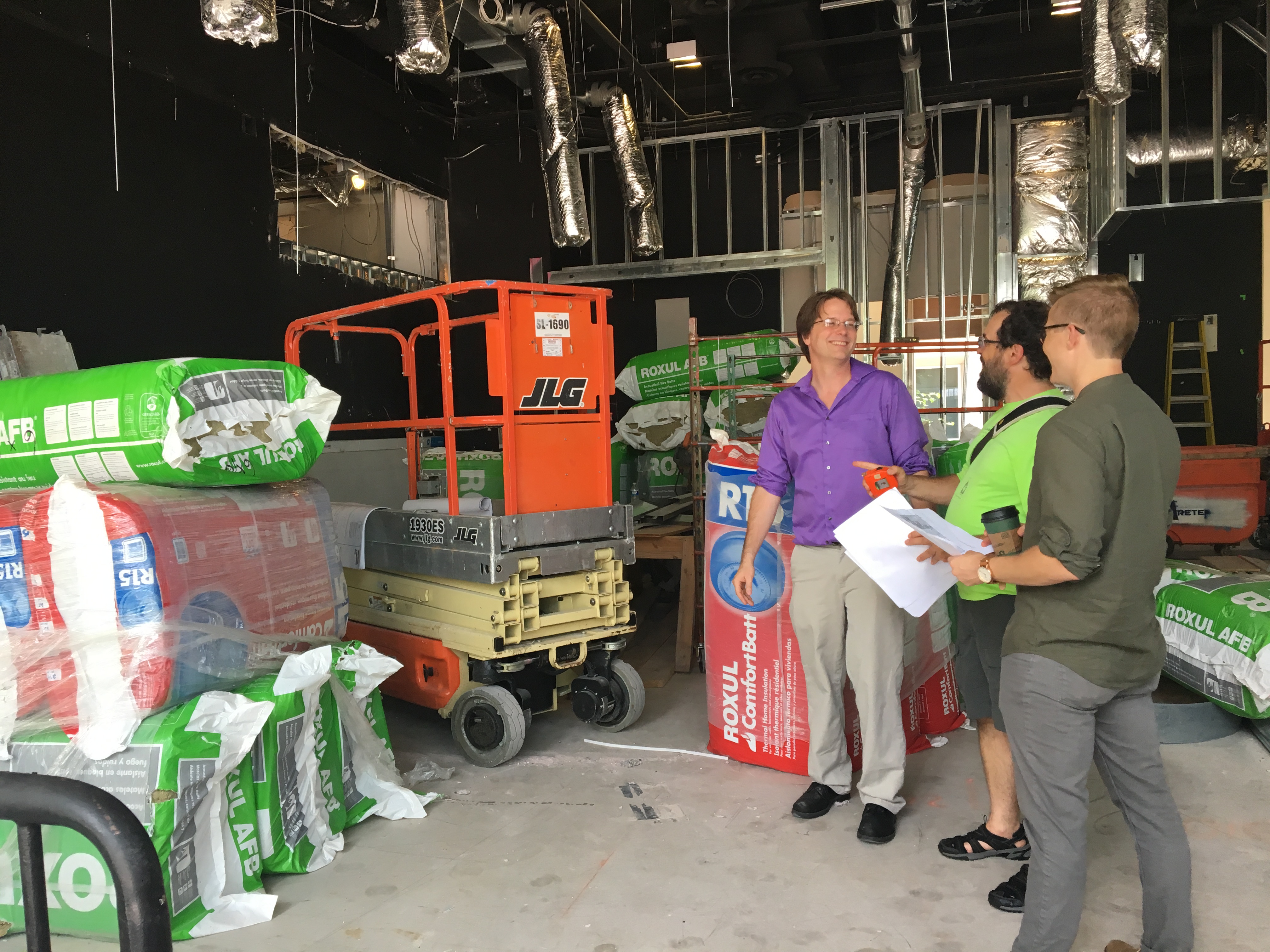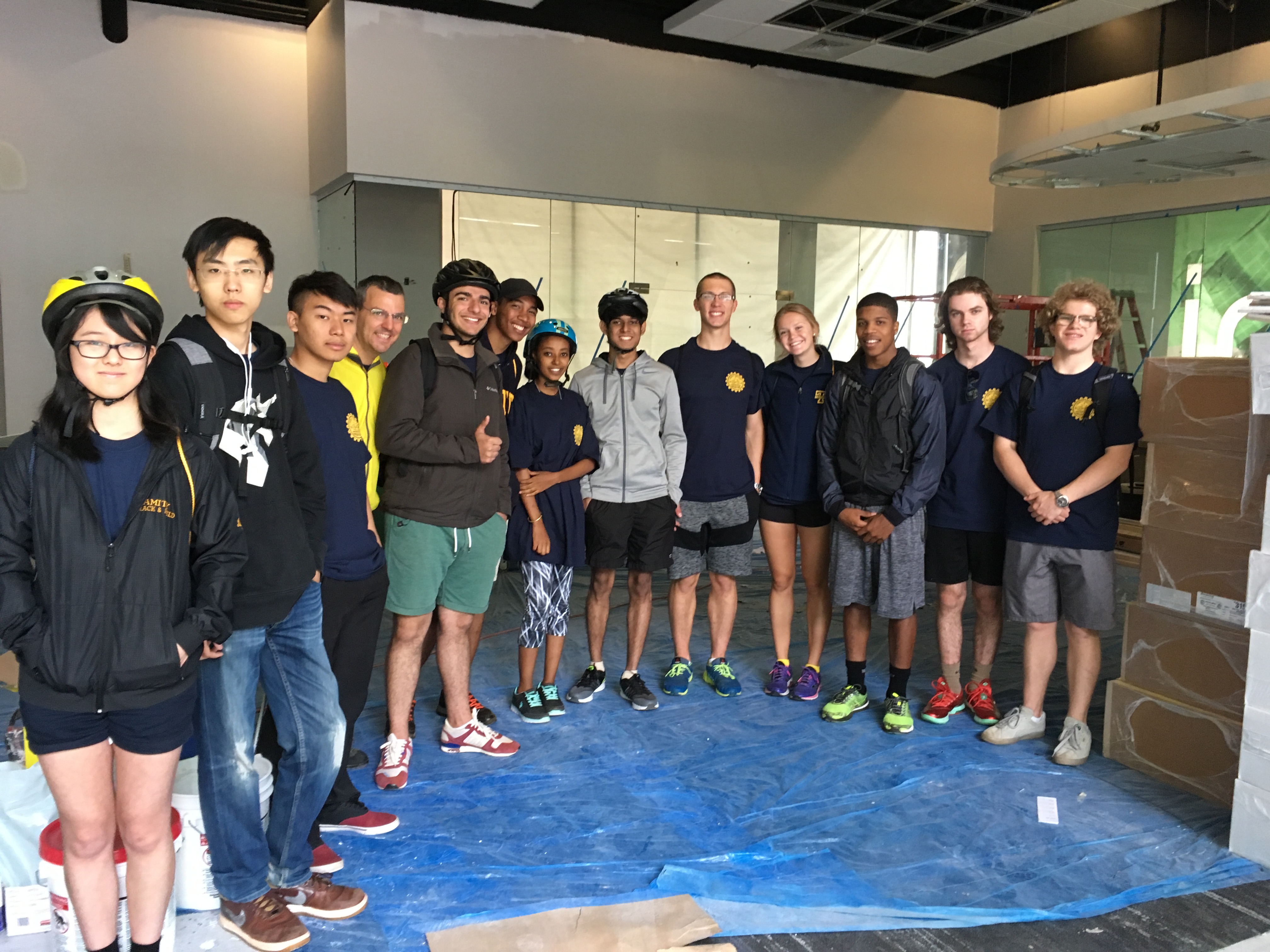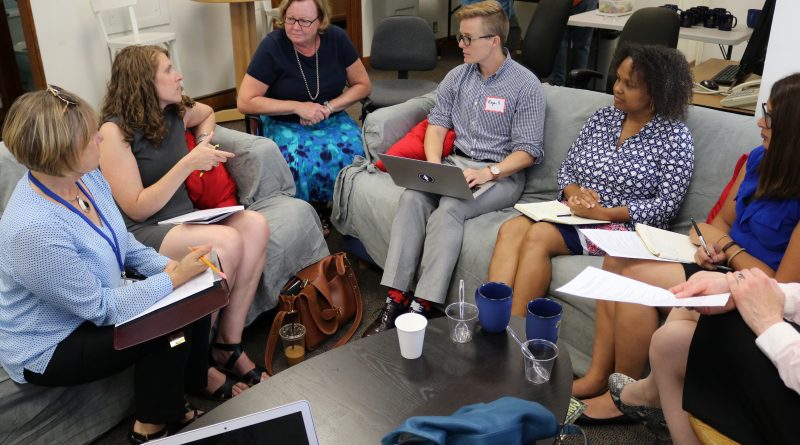Pictured above is the Student Success Project Team at the Spring 2019 Digital Poster Fair. Photo by Erica Crowley, Trinity College, Center for Hartford Engagement and Research (CHER)
From the fifteen proposals submitted by Hartford community partners, the Liberal Arts Action Lab has formed five research teams for Spring 2020. These project teams will focus on a diverse set of issues facing Hartford from raising awareness about the first black Congregational church in the city to tackling the opioid epidemic. All students will meet together in the Action Research Methods course on Monday afternoons and also will participate in one of the five Hartford research project teams below:
Black Heritage Project
It is probably not an exaggeration to say that the corner of Talcott and Market Streets directly behind Capital Community College is the most important black history site in Hartford. Talcott Street Congregational Church, which was built on this site early in the 19th century, was the first black Congregational church in Hartford (third in the nation) and it housed the first black school in Hartford. Important black voices in abolition and emancipation, and even reparations, emanated from this site: Rev. Easton, Rev. Pennington, Deacon Mars, and more. Ann Plato, whom Henry Louis Gates, Jr. describes as “the first Afro-American to publish a book of essays (1841),” and who also had roots linked to the Algonquian peoples of Long Island Sound, was a parishioner of the church and a teacher in the black school. The significance of this site to the history of Hartford needs to be recognized and publicized. For Capital Community College, whose black student population makes up the largest racial category in the college (36% in 2018), this site of historical and educational significance needs to be prominent. Countless students, staff, and faculty have walked by this site every day since the college moved to its downtown location in 2002, but with no historical marker and little-to-no public awareness of the site’s significance, this important historical site remains “hidden in plain sight” even with efforts to raise awareness through a temporary art project Real Art Ways commissioned with artist Mel Chin in 1991. Hartford Heritage Project and Hartford History Center are asking for help to raise awareness about the significance of Talcott Street Congregational Church.
Day and time: Wednesday afternoons, 1:15-3:55 pm
Taught by: Jeff Partridge, Capital Community College Action Lab Faculty Director
Community Partner: Jasmine Agosto and Brenda Miller, Hartford History Center at Hartford Public Library
Faculty Fellow: Stephen Thorton, Shoeleather History Project
Neighborhood Communications Project
The City of Hartford’s Office of Community Engagement would like to better understand how residents receive information on city services, activities, and resources and how residents want to communicate and receive answers to questions or concerns about the city government. The office simultaneously relies on residents’ trust, and they’ve worked to build trust through their performance. While the city has made significant progress in building trust and responding to complaints in a timely manner, they would like research on how residents want to receive information about their local government.
Day and time: Thursday afternoons, 1:30-4:10 pm
Community Partner: Janice Castle, City of Hartford, Office of Community Engagement
Faculty Fellow: Aidali Aponte-Aviles, Trinity College
Addiction Treatment Project
The opioid epidemic plaguing the nation is having a particularly tragic impact on Connecticut, and Hartford specifically. Connecticut is projected to lose 1,088 lives to drug overdose in 2019. Although efforts and new funding are being dedicated to combat the opioid crisis, treatment approaches are inconsistent and relatively ineffective. Medication Assisted Treatment is emerging as the preferred treatment mode. However, studies indicate a drop out rate between 50% and 75% for this treatment. InterCommunity Health Care is developing a new treatment model for opioid and other drug addictions called I CAN Recover. I CAN Recover combines intensive and culturally-informed care management across multiple levels of treatment in addition to medication. InterCommunity Health Care believes that this model will prove to be more impactful than existing MAT programs and has the potential for becoming the national standard for opioid addiction treatment. In order for I CAN Recover to be recognized as a best practice and be duplicated in other communities beyond Hartford’s North End, this community partner is asking for a detailed treatment outcome study including comparisons to existing treatment modalities.
Day and time: Wednesday afternoons, 1:15-3:55 pm
Community Partner: Tyler Booth, InterCommunity Health Care
Faculty Fellow: Laura Holt, Trinity College
HIV Community-Health Project
Healthcare access among sexual and ethnic minorities limited positive population health outcomes, particularly among emerging adults. Despite remarkable biomedical advances in the prevention of sexually transmitted diseases, 1 in 2 black men and 1 in 4 Hispanic men who have sex with men will end up with an HIV diagnosis in their lifetime. Moreover, pregnant black women living with HIV are likely to fall out of HIV primary care during postpartum. In Connecticut, the Hartford Health department has supported the certification of HIV community health workers in order to facilitate improvement in linkages to the care of sexual and ethnic minorities. However, to date, there is limited data analysis accessing the workforce development barriers among HIV community health workers, who have demonstrated how a community health approach can address the above-mentioned health disparity. Yale School of Public Health: ARCH Lab asks for an analysis to identify workforce development barriers for community health workers providing care to folks living with HIV.
Day and time: Tuesday afternoons, 1:30-4:10 pm
Community Partner: Cecil Tengatenga, Yale of School Public Health: ARCH Lab
Faculty Fellow: Adolfo Sanchez-Blanco, Capital Community College
Arts Education Project
Teaching artists are booked directly by PK-8 classroom teachers in thirty Hartford Public Schools. Multiple programs occur at the same time in different settings, including PE, general education classrooms, visual arts, and music rooms. Hartford Performs is interested in evaluating the effectiveness of programs in PK-8 classrooms to aid in student learning, improve attendance, build student trust in adults with positive rapport, and evidence of curriculum enhancement. This community partner asks for help evaluating their programs by interviewing teachers to evaluate the curriculum connection and isolate the qualities that keep teachers coming back for more. This will help Hartford Performs identify strong artists or programs to begin building a sustainable middle school model as Hartford Public Schools enter the final phase of redesign and consolidation.
Day and time: Wednesday evenings, 6:30-9:10 pm
Community Partner: Jeanika Browne-Springer, Hartford Performs
Faculty Fellow: Rebecca Pappas, Trinity College
Contact Action Lab Director Megan Brown for questions or to learn how to apply for the next round of Action Lab projects.


